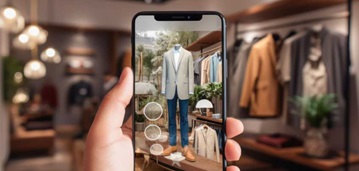How the Hospitality Industry is Using Technology to Improve Guest Experience

Hospitality is an especially competitive industry, as an increasing number of hotels vie for the hearts and minds of customers. As such, customer experience is critical in attracting and new and returning guests and in helping a property stand apart from its competitors.
Technology adoption in the hospitality sector has shown a marked increase in the last few years, with more hotels and other hospitality organizations embracing services and technologies to provide high-quality guest experiences. And as competition continues to grow, hotels are becoming more innovative in the way they use technology to improve the customer experience end to end, from reservation to check-out.
Mobility, connectivity and data all are driving digital disruption in the hospitality sector, as guests increasingly crave a high-quality, personalized experience. While mobility remains the top technology concern among guests, hotels are taking a comprehensive, holistic view of technology and the customer experience, looking at ways to use digital services to facilitate high-touch engagement while enabling guests to interact with staff as much or as little as they want to.
The technologies, processes and services that can fuel high-quality customer experiences need a solid foundation to be impactful. While technology may offer unlimited opportunity in both scope and results, it needs the right network infrastructure supporting it. Savvy hotels and other hospitality organizations understand that a solid foundation that addresses performance, reliability and affordability will enable them to grow their business faster and more securely and position them to take advantage of future technology advancements that add to the customer experience.
Customer Experience in Hospitality
According to research firm Statista, in 2018 the hotel occupancy rate was 66.2%, growing steadily since 2009 and the highest amount since 2001.1 At the same time, the number of chain hotel properties totaled more than 46,000 as of June 2019, and more than 5,300 properties were in development as of September 2018.2
Boutique hotels are holding their own, as well. According to IBISWorld, the market size of the boutique hotels sector in the United States has grown an average of 7.3% per year between 2014 and 2019.3
Couple that growth with the competition hotels are facing from disruptors such as Airbnb and HomeAway, and it is clear that hotels need to focus on ways to improve guest experience and increase customer loyalty.
Many recognize this growing need and are taking steps to create a customer-focused environment. According to a survey conducted by Hospitality Technology, 72% of guests said they are likely to return to a property when the tech they want is available.4 And what are guests looking for? According to the study, the top three technologies influencing their decision on where to stay are free Wi-Fi (84%), the ease of online booking process (61%) and being able to clearly view photos or video of the property (59%).5
On property, location-based services are in-demand among guests, who increasingly want their devices to know where they are and make appropriate recommendations, according to the Hospitality Technology report. In fact, location-based services trail only behind reservations—both the ability to make and ability to change or cancel—and the ability to receive/redeem coupons, gift cards and other offers as the top mobile technology desired by guests.6
To ensure customers are delighted from the moment they hit the “make reservation” button on the hotel’s website to the moment they select “checkout” on their mobile app or in-room TV, hotels are investing in technologies that enhance the guest experience, with an eye toward improving employee-guest interactions. Almost half (42%) of hoteliers taking part in the Hospitality Technology survey are investing in staff-facing technology, while slightly more than a quarter (27%) are investing in guest-facing self-service technology.7
Customer Experience Driving Technology Decisions
Many of the technologies hotels are investing in are geared toward creating an environment of engagement and personalization, two factors hotel guests are looking for, according to a recent Deloitte study. In fact, when it comes to guest satisfaction with the hotel experience, more than two-thirds (67%) of respondents said they were most satisfied with the feeling of empowerment the hotel enabled through technologies that allowed them the access to drive their experience the way they wanted, such as being able to check in and choose their ownroom via mobile device, while a similar number were most satisfied with the level of engagement (66%) and knowing the guests and their preferences (65%).8
Data is the thread that connects all aspects of a high-quality customer experience in the hospitality sector, combining what the hotel knows—guest information from reservations, loyalty programs and past stays—with other available data—such as reviews and contacts with the hotel via social media—a hotel can address concerns or prepare for special requests. For example, the hotel can address a guest’s online complaint regarding the use of down pillows in the guest rooms—to which he is allergic—by offering a free night stay or spa treatment and proactively switching the pillows in his room during his next stay.
Many of the technologies that help employees improve the guest experience have the added benefit of streamlining operations as well. For example, something as simple as equipping housekeeping and maintenance staff with smart watches or mobile devices can be more effective in alerting them when service is needed, such as when a room is ready for cleaning or a clogged sink needs to be fixed. Rather than the guest contacting the front desk for service, a voice-enabled bot reached via an in-room tablet or mobile app can send an alert automatically to summon help faster.
The data collected by these technologies also can help improve the guest experience during future visits. For example, guest requests taken by the bots, such as those for extra pillows or a razor, can be combined with historical information to enable the hotel to fulfill these requests proactively during the customer’s next stay. Such small gestures can go a long way in personalizing the experience for the guest.
Engagement also is important for improving the customer experience, and some hotels are using technologies in innovative ways to advance engagement. The Restoration Hotel in Charleston, South Carolina, has kicked off a citywide scavenger hunt and is inviting guests to post their finds on social media using the hashtag #charlestonchallenge. The idea behind the hotel’s program is to reach a millennial audience in particular, who tend to favor spending on experiences over material goods, as well as reach new customers.9
Virgin Voyages, meanwhile, has created a “Shake for Champagne” feature on its Virgin Voyages Sailor mobile app. When the app is shaken, a secret button is revealed that, when pressed, orders a bottle of Möet & Chandon Impérial to be delivered to the user. 10
Customer Experience and the Network
The technologies, processes and services that can advance customer experience in hospitality need a solid foundation to be impactful. While customer-facing applications may offer unlimited opportunity to delight customers, they won’t make a positive impact without the necessary infrastructure. Smart hotels and other hospitality organizations understand that a solid foundation that addresses performance, reliability and affordability will enable them to grow their business faster and more securely and position them to take advantage of future technology advancements—all of which positively impact customer experience.
To fully realize the power of the technologies that advance customer experience, many hotels are adding or upgrading their networking infrastructure in ways that don’t require “ripping and replacing” their current technologies and enable them to derive continued value. Adding software-defined networking technologies to complement their existing MPLS network, for example, can add needed capacity to run data-heavy workloads without stressing the network and increase the speed of data ingest from and response to all points on the network.
Likewise, edge networking is coming into its own among organizations dealing with data-intensive workloads. Pushing network intelligence to the edge will enable data to be processed at the edge of the network—on edge devices such as routers or switches—rather than at the data center, reducing bandwidth needs and accelerating response. Cloud and on-premises data centers and ultimately the customer experience can benefit from reduced latency and increased processing power afforded by edge networking.
Hotels that don’t have the ability to upgrade their networks due to cost, capacity or other reasons, can turn to managed services providers to “fill in the gaps” in their current infrastructure. Managed services can benefit network, security and IT operations and business analytics, enabling organizations of all sizes and business models to take advantage of the latest in digital transformation technologies for superior customer experience without spending all their time and efforts on managing their networks.
Conclusion
The level of competition in the hospitality sector means customer experience is especially critical for hotels in outpacing their competition. The need to differentiate themselves byproviding innovative services is driving many hotels to focus heavily on customer experience, to the delight of their guests.
The technologies, processes and services that can propel high-quality customer experience in hospitality, however, need a networking infrastructure designed to be robust enough to fully support a meaningful customer experience. A solid network with the right technologies will enable them to grow their business faster and more securely and position them to take advantage of future technology advancements that further add to the customer experience.
Learn about how Comcast Business is helping the hospitality organizations better serve guests.
[1] “Hotel occupancy rate of the United States from 2001 to 2018,” chart, Statista, 2019
https://www.statista.com/statistics/200161/us-annual-accomodation-and-lodging-occupancy-rate/
[2] “Leading hotel companies worldwide as of June 2019, by number of properties,” chart, Statista, 2019
https://www.statista.com/statistics/197869/us-hotel-companies-by-number-of-properties-worldwide/
[3] “Boutique Hotels in the US, Market Size 2003–2024,” IBISWorld, Sept. 2018
https://www.ibisworld.com/industry-statistics/market-size/boutique-hotels-united-states
[4] “2019 Hospitality Industry Technology Study,” Hospitality Technology,
https://hospitalitytech.com/2019-customer-engagement-technology-study?from=gate
[5] Ibid
[6] Ibid
[7] Ibid
[8] “Nex-gen guests hotel have checked in: The changing guest experience,” Deloitte, 2018
https://www2.deloitte.com/us/en/pages/consumer-business/articles/hotel-guest-experience-strategy.html
[9] “Charleston-based Boutique Hotel Introduces Citywide Insta-Worthy Scavenger Hunt,” Hospitality Technology, Oct. 9, 2019
https://hospitalitytech.com/charleston-based-boutique-hotel-introduces-citywide-insta-worthy-scavenger-hunt
[10] "Virgin Voyages Lets Sailors Request Champagne with a Shake of Their Phone,” Hospitality Technology, Oct. 9, 2019
https://hospitalitytech.com/virgin-voyages-lets-sailors-request-champagne-shake-their-phone
Tech-supported CX has become a key differentiator for hospitality.
Locked Content
Click on the button below to get access
Unlock NowOr sign in to access all content on Comcast Business Community
Learn how Comcast Business can help
keep you ready for what's next.











